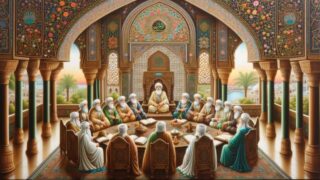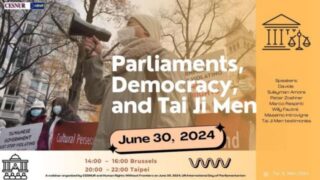An old but wrong idea is that those with intolerant ideas should not be tolerated. In fact, we are all intolerant of something.
by Massimo Introvigne*
*A paper presented at the webinar “Tolerance for Tai Ji Men,” co- organized by CESNUR and Human Rights Without Frontiers on November 16, 2022, United Nations International Day of Tolerance.


Although the word existed before, and some early theories had been advanced in the United Kingdom, the first comprehensive theory of tolerance was developed by the French Enlightenment philosophers, particularly by Voltaire. It can be summarized in one sentence: the state should tolerate all religions and philosophies, except those that are themselves intolerant.
At first sight, it looks like a logical construction. If we look deeper into it, however, we realize it is a totally wrong theory, and the root cause of some of the worst tragedies in the Western world and beyond. Voltaire’s definition had a specific target, the Roman Catholic Church. Since the Catholics were intolerant and claimed theirs was the only true religion, a secular state should not tolerate them. In fact, they should be persecuted, according to Voltaire’s motto “Écrasez l’infâme,” “Destroy the infamous one,” i.e., the Catholic Church.
Catholic critics answered from the beginning that, since he was intolerant towards the Catholics, by applying his own definition of tolerance the state he had in mind should not tolerate Voltaire either. This was as a good ad hominem argument but somewhat missed the larger picture. The fact is that all religious and philosophical doctrines are intolerant of something or somebody, except perhaps absolute relativism, but even the latter would not be tolerant of those who are not relativists.
A pacifist would be intolerant of those who believe that some wars are just; an ecologist would be intolerant of those who pollute, and so on. By excluding the intolerants from the scope of tolerance, Voltaire reduced tolerance to an empty box. Worse, he prepared the atrocities of the Terror of the French Revolution, which was in turn the model of Communist terror. Millions were killed by proclaiming they had no right to tolerance because they were themselves intolerant.


In the religious field, Voltaire’s tradition continues even today. In Russia, a law bans as “extremist” those “intolerant” religions teaching that they preach a truth superior or more comprehensive than other religions. Of course, all religions do this, including the Russian Orthodox Church, which is however protected by other regulations. I never met a religionist who told me, “Let me introduce my religion, which perhaps is true and perhaps is not true.” Clearly the Russian law is a tool that can be used against all religions, and in fact is used against those the government does not like.
In France, Voltaire’s own country, a law against “separatism” and the continuous action of the governmental mission against “cultic deviances” MIVILUDES harass all high-intensity religious groups, particularly those labeled as “cults.” One of the criteria identifying them as “cults” is that they teach their members that only their path leads to truth and salvation, making them intolerant of other groups and separated from the common values of the French Republic rooted in the tradition of Voltaire.
Again, a grandchild of the Catholic apologists who first answered Voltaire may easily object that anti-cultists are an egregious example of intolerance, because they reserve the right to label as “cults” and persecute the groups they have decided they are not prepared to tolerate.


Are they limits to tolerance? Yes, otherwise we should all tolerate terrorism or pedophilia. However, limits should be interpreted restrictively. Americans were so scared by the French Terror that their courts adopted a broad concept of tolerance of obnoxious ideas, as opposite to criminal actions, which continues to this very day. For example, American courts have consistently allowed Nazi parades, unless participants commit or incite to commit acts of violence. Europe has a different approach, but where Nazism is prohibited it is not because it is intolerant, it is because justifying and advocating violence and crimes against Jews and others is part of its essence.
We should not tolerate violence, incitement to violence, or incitement to commit other common crimes. But a democratic state should tolerate different religious worldviews, most of which are intolerant of other worldviews or lifestyles. The dramatic mistake of Voltaire should be corrected by proclaiming that religions and philosophies have a right to be in different ways intolerant, and should still be tolerated.
By all normal logical standards, Tai Ji Men promotes one of the most tolerant worldviews ever. Yet, it became a victim of persecution rooted, as Gordon Melton explained in last month’s hybrid seminar in Walnut, in a bureaucratic attitude cracking down on all those who have strong ideas based on religious or spiritual principles.


Tai Ji Men dizi are not protected by a Voltaire-style notion of tolerance and, even being the most tolerant persons in the world, may always be accused of intolerance. By insisting on conscience, perhaps they are intolerant of those who do not believe in the primacy of conscience. By opposing tax bonuses, perhaps they are intolerant of those tax bureaucrats who believe in bonuses with the same fervor others believe in religion.
A limited notion of tolerance sooner or later generates intolerance. On International Day of Tolerance, we should insist on tolerance for all law-abiding citizens, based not on their belief and not even on their own practice of tolerance, but on their inviolable dignity as human beings.









